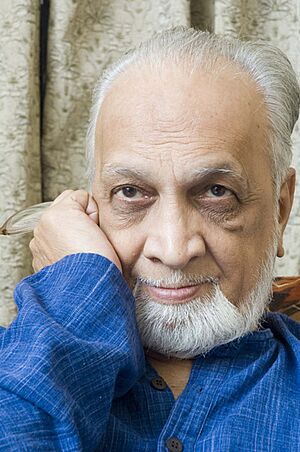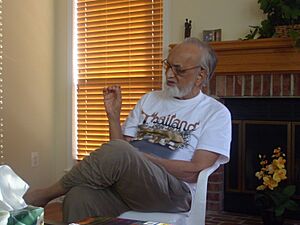Vijay Tendulkar facts for kids
Quick facts for kids
Vijay Tendulkar
|
|
|---|---|

Tendulkar in 2007
|
|
| Born |
Vijay Dhondopant Tendulkar
6 January 1928 |
| Died | 19 May 2008 (aged 80) Pune, Maharashtra, India
|
| Children | 3, including Priya Tendulkar |
| Family | Mangesh Tendulkar (Brother) |
| Awards | Padma Bhushan: 1984 Sangeet Nātak Akademi Fellowship: 1998 National Film Award for Best Screenplay: Manthan, 1977 |
Vijay Dhondopant Tendulkar (born January 6, 1928 – died May 19, 2008) was a very famous Indian writer. He wrote many plays, movies, and TV shows. He also wrote essays and worked as a journalist. Most of his work was in the Marāthi language.
Vijay Tendulkar was known for writing plays with new and different ideas. His most famous plays include Shantata! Court Chalu Aahe (1967), Ghāshirām Kotwāl (1972), and Sakhārām Binder (1972). Many of his plays got ideas from real-life events and big changes happening in society. His stories often showed the tough parts of life. He was an important person in theater in Mahārāshtra for more than 50 years.
Contents
Early Life of Vijay Tendulkar
Vijay Dhondopant Tendulkar was born in Mumbai, Maharashtra, on January 6, 1928. His father worked in an office and also ran a small publishing business. Being around books and writing at home made young Vijay want to write too. He wrote his very first story when he was just six years old!
He loved watching plays from Western countries. These plays inspired him to write his own. When he was eleven, he wrote, directed, and even acted in his first play.
At age 14, he joined the 1942 Indian freedom movement. This meant he stopped his studies for a while. It also made him feel a bit distant from his family and friends. Writing became a way for him to express himself during this time. Most of his early writings were personal and not meant for others to read.
Vijay Tendulkar's Career
Starting Out as a Writer
Tendulkar started his career by writing for newspapers. He had already written a play called Āmcyāvar Koṇ Preṃ Karṇār? (Who is going to love me?). He also wrote another play, Gṛhastha (The Householder), when he was in his early 20s. This play didn't get much attention, and he even promised himself he would never write again.
But he broke that promise! In 1956, he wrote Śrīmant. This play made him known as a good writer. Śrīmant surprised people because it had a very modern story for its time. It was about a young unmarried woman who decides to keep her baby. Her rich father tries to arrange a marriage for her to save his family's reputation.
Tendulkar faced challenges early in his life and lived in small apartments in Mumbai. This gave him a close look at the lives of ordinary people in the city. He used these experiences to make his characters in Marathi theater feel very real. His writing quickly changed Marathi theater in the 1950s and 60s. Actors like Shriram Lagoo, Mohan Agashe, and Sulabha Deshpande helped bring his stories to life.
In 1961, Tendulkar wrote the play Gidhāḍe (The Vultures). However, it wasn't performed until 1970. This play was about a family where morals had broken down, and it explored the idea of violence. Gidhāḍe was a big moment for Tendulkar. It helped him create his own special writing style.
Based on a short story from 1956, Tendulkar wrote the play Śāntatā! Court Cālū Āhe (Silence! The Court is in Session). It was first performed in 1967 and became one of his best works. Later, in 1971, it was made into a movie, and Tendulkar helped write the screenplay.
Plays and Movies in the 1970s and 1980s
In his 1972 play, Sakhārām Binder, Tendulkar explored how men sometimes tried to control women. The main character, Sakhārām, didn't care about rules or traditional marriage. He used modern ideas to try and control women. But some of the women he tried to control also wanted their freedom.
In the same year, 1972, Tendulkar wrote another very famous play, Ghāshirām Kotwāl (Officer Ghāshirām). This play was about political violence. It was a musical drama set in the 1700s in Pune. It mixed traditional Marathi folk music with new theater styles. This play showed how well Tendulkar understood how groups of people behave. It earned him a special award called the Jawaharlal Nehru Fellowship. Ghāshirām Kotwāl has been performed over 6,000 times and is one of the longest-running plays in Indian theater history.
Tendulkar also wrote screenplays for many movies. These include Nishānt (1974), Ākrosh (The Cry) (1980), and Ardh Satya (The Half-Truth) (1984). These movies showed him as someone who wrote about the violence of his time. He wrote eleven movies in Hindi and eight in Marathi. His Marathi movies include Sāmanā (Confrontation) (1975), Simhāasan (Throne) (1979), and Umbartha (The Threshold) (1981). Umbartha was a very important film about women's rights in India.
Later Works: 1990s to 2008
In 1991, Tendulkar wrote a play called Safar. In 2001, he wrote The Masseur. In 2004, he wrote his first play in English, called His Fifth Woman. This play was a follow-up to his earlier play Sakhārām Binder, continuing to explore the challenges women faced. It was first performed at a festival in New York in 2004.
In the 1990s, Tendulkar wrote a popular TV series called SwayamSiddha. His daughter, Priyā Tendulkar, who was a well-known TV actress, played the main role in it. His last movie screenplay was for Eashwar Mime Co. (2005).
Family Life
Vijay Tendulkar's brother was Mangesh Tendulkar, a famous cartoonist and humorist.
Death
Vijay Tendulkar passed away in Pune on May 19, 2008. He had been battling a rare illness called myasthenia gravis.
Sadly, Tendulkar's son Raja and his wife Nirmala both died in 2001. His daughter, Priya Tendulkar, passed away the next year in 2002.
Legacy and Impact
Vijay Tendulkar wrote for over fifty years. During this time, he created 27 full-length plays and 25 one-act plays. Many of his plays became classics in Marathi theater. His works have been translated and performed in many different Indian languages.
Tendulkar gave insights into major social and political events of his time. He became one of the strongest voices in Maharashtra who spoke out about important issues. While other writers were careful, he bravely explored political problems and showed the hidden truths in Indian society. His powerful way of showing human struggles made him very popular, but also sometimes criticized by traditional groups and powerful politicians.
Many of Tendulkar's plays were inspired by real-life events or big social changes. He also translated nine novels, two biographies, and five plays by other authors into Marathi.
Besides plays, Tendulkar also wrote a biography, two novels, five collections of short stories, and 16 plays for children. These children's plays include Bāle Miltāt (1960) and Pātlāchyā Poriche Lagin (1965). He also wrote five books of essays and social commentary. Overall, Tendulkar's writings greatly changed the world of modern literature in Marathi and other Indian languages.
In 2005, a documentary film called Tendulkar Āni Himsā: Kāl Āni Āj (Tendulkar and Violence: Then and Now) was released. In 2007, a short film about him, Ankahin, was also released.
Awards and Recognition
Vijay Tendulkar received many awards for his amazing work. He won Maharashtra State government awards in 1969 and 1972. He also received the Mahārāshtra Gaurav Puraskār in 1999.
He was honored with the Sangeet Nātak Akademi Award in 1970. Later, in 1998, he received the Academy's highest award for his "lifetime contribution" to arts, called the Sangeet Natak Akademi Fellowship. In 1984, the Government of India gave him the Padma Bhushan award for his literary achievements.
In 1977, Tendulkar won the National Film Award for Best Screenplay for his work on Shyām Benegal's movie, Manthan (1976). He wrote screenplays for many important art movies like Nishānt, Ākrosh, Ardh Satya, and Aghaat.
Here is a list of some of his awards:
- 1970 Sangeet Nātak Akademi Award
- 1970 Kamaladevi Chattopadhyay Award
- 1977 National Film Award for Best Screenplay: Manthan
- 1981 Filmfare Best Screenplay Award: Aakrosh
- 1981 Filmfare Best Story Award: Aakrosh
- 1983 Filmfare Best Screenplay Award: Ardh Satya
- 1984 Padma Bhushan
- 1993 Saraswati Samman
- 1998 Sangeet Natak Akademi Fellowship
- 1999 Kalidas Samman
- 2001 Katha Chudamani Award
- 2006 The Little Magazine SALAM Award
See also
- List of Indian writers
 | Lonnie Johnson |
 | Granville Woods |
 | Lewis Howard Latimer |
 | James West |


